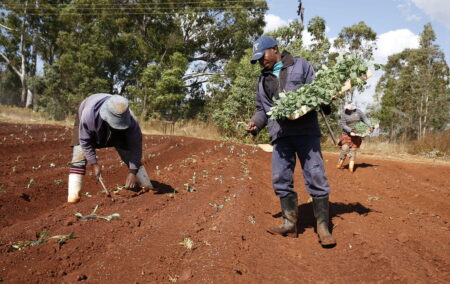Despite flamboyant claims doing the rounds, Covid-19 has not changed everything. Its immediate impact has been profound, and what it means for the future is an open question. But beneath the mask-wearing and military-policed surface of our society, much moves along as it has in the past. Whether this is a cause for relief or consternation depends on one’s perspective.
Earlier this week, it was announced that Limpopo farmer David Rakgase was finally to be a property owner and not merely a tenant. This would bring to conclusion a frustrating battle – ongoing since 2002, or for the better part of the country’s post-apartheid history – to buy the state-owned farm he had first started working in 1991.
Having built a successful farming operation, Rakgase had been trying to buy the farm since 2002. Initially the government agreed. And logically enough, too, if a growing community of prosperous black farmers was something that government wished to promote. For some years, he was referred to in official communication as the owner of the property.
In 2010, however, government changed its mind. No sale, no ownership – rather a long-term lease, which in the event was for five years. He agreed to this, reluctantly, fearing that he might be evicted if he did not. This fate had, apparently, befallen some of his neighbours. For some time the uncertainty continued, until he was offered a 30-year lease, with the possibility of extension. By then he was in his 70s.
In frustration, he turned to the courts; the judgment handed down in September last year was damning of the state’s position. ‘There is no explanation why,’ the judgment read, ‘when the well-motivated occasion for conversion of a right presented itself, it was shied away from and the elderly Applicant was presented with a much lesser right, being a long-term lease, the end of which he will not see in his lifetime. The argument on behalf of the Minister that the Applicant has security of tenure and that there are no imminent eviction prospects on his horizon smacks of callousness and cynicism, particularly given our country’s historical deficiencies in dealing with land reform.’
It ordered that the sale be approved and the farm transferred in line with the 2003 agreement.
Breathtakingly, government initially announced that it would appeal the decision, and when it backed down from that, proposed a price well in excess of that asked in 2003 – contrary to the court order.
Toxic publicity
It seems now that it has bowed to the court’s decision and to the toxic publicity that it has brought on itself, and it has agreed to the sale.
Why government would go to these lengths to deny ownership to a black South African is a question that hangs in the air, and has profound implications for South Africa’s future.
Contrary to what the court’s judgment said, there is an explanation for the state’s actions, and it is simply stated: there exists a profound ambivalence on its part about property rights in land.
Since Rakgase began his arduous journey, the policy of government has been against the transfer of ownership to land reform beneficiaries (certainly in the land redistribution programme, which is the primary vehicle to provide land to aspirant and emergent farmers). The State Land Lease and Disposal Policy is unequivocal on this: land will be granted on leasehold terms, with the option to purchase being available only after the beneficiary has satisfied officials that he or she can farm to their satisfaction over an extended period. This was set at an initial period of 30 years, followed by a renewal for 20 (this has been shortened by a revision to the policy in 2019 – although very little publicity has been given to this).
Government’s court papers in the Rakgase case set this out clearly. It was policy that the ‘principle that black farming households and communities may obtain 30-year leases, renewable for a further 20 years, before the state will consider transferring ownership to them’.
And not all ‘black farming households and communities’ are so eligible – only those able to produce on a substantial commercial scale.
Paternalistic
At its most charitable, this is paternalistic: the state as the benevolent landlord looking out for its citizens. But that would hardly match much of what we know of beneficiaries’ experience. Research by Ruth Hall and Thembela Kepe on farms apportioned under this scheme found most without so much as a lease, and therefore no real rights at all. Rakgase could add that when his farm was invaded, he was not able to evict the unwelcome newcomers as he lacked locus standi in the matter. His own view of the state’s role is decidedly uncharitable.
‘The government won’t protect me,’ he says. ‘Their officials are the reason my farm was invaded in the first place.’
Rakgase now awaits his title deeds, something well worthy of celebration.
Does it signal a real change? Government’s approach to land reform has been ideological and state-centric. This approach has failed to promote real land reform and will empower no one but the government itself. It is no solution for those wanting to farm.
Yet there is little to indicate that either this experience or the economic body blows of the Covid-19 pandemic have done much to shift official thinking. Expropriation without compensation remains under consideration, with a gutted Property Clause, enhanced executive powers and new expropriation legislation to drive it along.
Meanwhile, there may well be other David Rakgases in the country. Those of us concerned about the country’s future should not forget them.
If you like what you have just read, subscribe to the Daily Friend

